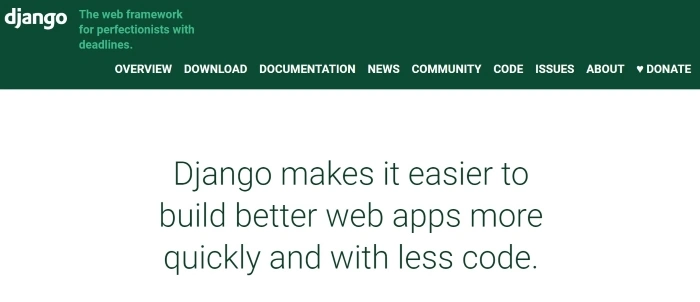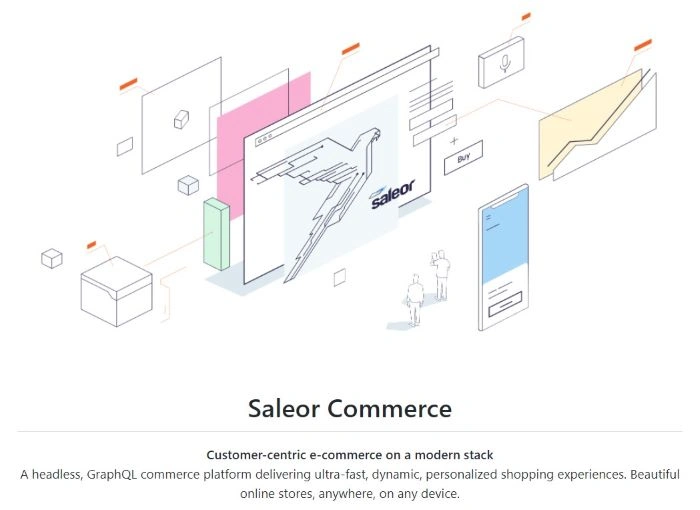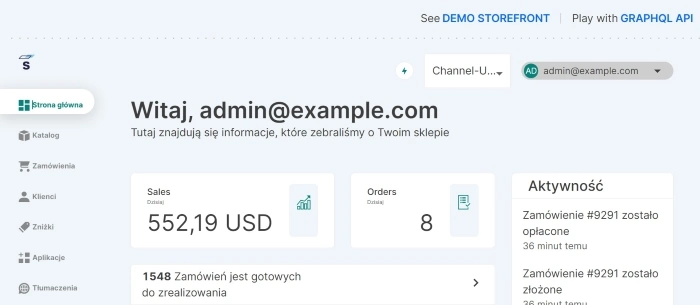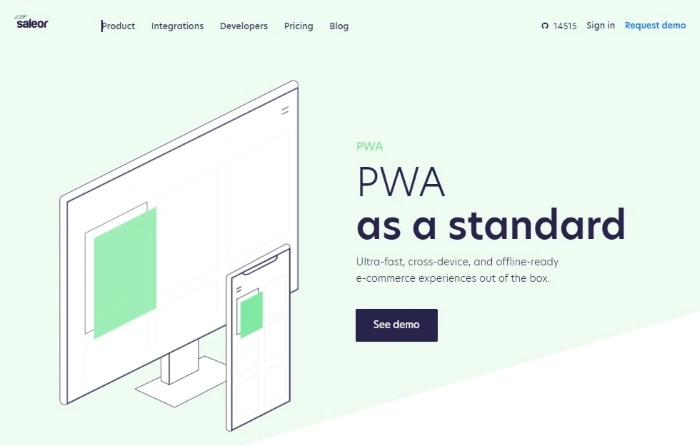The answer to the question of whether Python, Django, and Saleor are the most appropriate technologies for e-commerce is quite obvious.
As obvious as the answer to the question, does a tie match a tuxedo?
We'll confidently say yes to both questions. While we'll count on our fashion sense for ties and tuxedos, we have some powerful arguments for Python, Django, Saleor, and e-commerce.
Python is the best programming language for creating an online store or an e-commerce platform for several reasons.
Python offers capabilities worth their weight in gold in e-commerce, such as scalability, security, strong support, and promising potential for libraries and add-ons which transfer into enhanced customer satisfaction.
With such technological support, entering the e-commerce market provides a much better starting point and the necessary advantage. In the highly competitive domain of online business, these kinds of advantages are essential.
Why is e-commerce Python so useful?
What features of the Django e-commerce framework are particularly useful in creating online stores?
Why is the Saleor platform worth considering when designing and building an online store?
You ask, we answer!
Why should you choose an open-source e-commerce? Choosing a platform for an online store
Even before the pandemic, e-commerce offered tremendous opportunities. With each passing year, e-commerce has grown and played an increasingly important role. In the era of pandemic restrictions, e-commerce, and online shopping were necessities and opportunities.
This is especially true since Python, Django, and Saleor offer, together and separately, the possibility of rapid digital transformation, including building an online store tailored and customized to the already existing business and internal processes.
They offer an easier way to enter the market and establish a presence without building a business and logistics foundation from scratch, significantly accelerating an organization's digital transformation.
Nevertheless, it's also important to think ahead, creating an online store that will naturally grow with the business and be able to meet increasingly complex requirements. For e-commerce businesses, time and costs are essential assets.

Open-source software, available without purchasing expensive licenses, allows commercial use and means huge savings.
It's not just about the savings from the lack of fees but also the profit from the fact that open-source software is created by thousands of dedicated developers who constantly develop it, improve it, enhance it, and adapt it to new conditions.
On the one hand, a well-chosen stack of open-source software provides us with a vast array of tools to build any business logic of our e-commerce solution in a time acceptable for sales and business.
On the other hand, it significantly speeds up the performance of routine tasks in web development (software development), logistics, financial sales processing, etc.
Proven open-source solutions (e-commerce framework) and a wide range of functionalities provide access to extensive documentation, a collection of best practices, a high level of security, and a large solution community.
Open-source in the case of e-commerce (but this rule applies to any business) ensures a much lower entry threshold and allows us to allocate funds to other areas.
Open-source software also provides the opportunity to use technology that:
- Has been subjected to a market usability test and passed it.
- Is constantly developed, tested, and improved by developers from different parts of the world with experience in different markets, which provides a vital accumulation of knowledge and experience.
- Is universal and has fewer limitations compared to commercial solutions, and can be freely modified to suit individual needs.
- Provides a high level of security and reliability.
- Is very quickly adapted to market changes — new capabilities and solutions emerge much faster within open-source than in the commercial domain.
- Guarantees much greater stability — its development isn't dependent on financial success or the software developer's competitive strategy.
When deciding between Python, Django, and the Saleor platform, we should be guided by sensible reasons, such as those related to the following:
- Expected number of users and customers of an online store and the seasonality of sales
- Anticipated traffic that we'll need to handle effectively and efficiently
- Complexity and uniqueness of sales processes
- Possibility of store development, the use of complex functionalities
- Ensuring the security of users, customers of a store, and the store itself.
In other words, we need to consider the problems of scalability, performance, security, maintenance, and development of an online store.
These are technical problems related to user experience, competitive strategy, and e-business development strategy. They condition each other and, as a whole, determine market success or failure.
Why is Python a perfect fit for e-commerce?
Of course, it's a coincidence that the emergence and development of Python and e-commerce fell in the same years and decades, but we must admit it's a telling coincidence.
If any programming language embodies the spirit of e-commerce, then Python does it best.

It won't be an exaggeration to say that Python and e-commerce fit together like a glove. And this is a common belief.
Python is recommended for e-commerce for many reasons, among which the most important are:
- Speed of creating an online store
- Availability of useful frameworks and libraries, solid documentation
- High compatibility of the language with different systems without loss of performance
- SEO-friendliness of frameworks written in Python
- Security
- Versatility and universality
- Clarity of code, which significantly facilitates maintenance work, development, and bug-fixing
- Ability to offer multiple payment processing methods that can be easily integrated (such as Stripe)
- Ability to create large-scale projects.
In addition, Python is recommended for demanding and complex projects and those that require custom solutions.
Creating online stores in Python also has a strategic justification. Python is a beneficial solution from any perspective — short-term or long-term.
In Python, maintenance, development, and implementation of new functionalities are much simpler, less time- and work-intensive.
Examples of Python libraries:
Oscar
It's an open-source e-commerce framework built for Django. Oscar offers extensive documentation, integration with various payment gateways and SAP web services, and the capability of supporting a 12 million catalog supported by over 100 suppliers for a single project.
Shopify Python API
Shopify Python API allows developers to access Shopify's platform using Python. It facilitates the management of orders, customers, and products. Shopify also enables online store owners to perform customer segmentation, improve SEO, create customer profiles, and utilize various data analysis tools.
WooCommerce Python API
Like Shopify, the Python API allows programmers to interact with the WooCommerce platform and its features, including inventory management, order management, email templates, and more. Furthermore, thanks to the API, it's much easier to integrate Python-based applications with WooCommerce.
Shuup
Shuup is a source code created for Django. It allows business owners to build self-hosted and multi-vendor e-commerce platforms and offers integrations with Mailchimp, Google Analytics, and Stripe.
As a note, Saleor is also considered a Python library, but we describe it in more detail below.
Why use the Django framework as an e-commerce platform to create an online store?
Because of the scalability, you fool! In one sentence, we can summarize the most important reason for using the Django framework to create an online store.
Django is, above all, a web framework; it's not a monolithic e-commerce platform like PrestaShop or Magento.
It gives us the ability to create any logic for handling users. It's a framework that allows us to create a fault-tolerant, data integrity, and security-oriented backend for any web system.
Thanks to its versatility and huge library base, Django also works well as part of applications based on microservices or the headless CMS.
One of the main determinants of software scalability (including an e-commerce platform) is the extent to which we can divide the application into completely independent components.

A well-scalable application will have many independent components running on a separate infrastructure. Such an application can handle a seasonal, variable, and unpredictable number of users.
Platforms based on monolithic solutions, e.g., OpenCart and WooCommerce, are much less scalable, as all store components run within one application, one code, and usually one server.
Elements such as a store's frontend, the operation of the sales process by both the user and the store's backend, the CMS, the blog, sales statistics, and much more are triggered, to a greater or lesser extent, every time a user clicks on a link in the store. This is very inefficient, and such an application can hardly be called scalable.
Django combined with solutions such as Saleor and technologies such as FastAPI, Flask, or AWS, allows us to create truly scalable and error-tolerant software.
In contrast to monolithic solutions, by using the headless CMS and tools such as Next.js or React, we can create a genuinely unique user experience limited only by imagination and our experience without adapting the flow to the e-commerce platform.
Thanks to Django, we don't have to adapt our business to an e-commerce solution.
Especially in the pandemic era, when many companies have been forced into digital transformation. The ability to establish a presence in the online space without completely redesigning internal processes is vital.
This allows us to redirect or supplement existing sales with new tools seamlessly. The business doesn't need to adapt to the e-commerce platform; it is the platform that needs to adapt to the business.
Django also competes with e-commerce monoliths when it comes to security.
The framework is equipped with strong encryption packages and protection against popular types of attacks. It also has an extensive input validation system.
It also offers a solid user authentication system that can easily be extended or integrated with an external authentication system, such as AWS Cognito. Moreover, a large community supports the framework and regularly patches security vulnerabilities.
Advantages of Saleor's e-commerce platform
Mirek Mencel, one of Saleor's developers, summarized in an article "Our road to Saleor Commerce" the idea that Saleor is trying to make a reality.
From the very beginning, its creators aimed to meet the typical expectations of customers and e-commerce business owners.

E-commerce business owners want to create stores quickly and according to their expectations.
They want a store whose success won't surprise or overwhelm them. They want to create a store that simultaneously looks good on all devices and across all channels.
Saleor is recommended for e-commerce business owners experiencing very fast, dynamic growth.
Saleor is an open-source e-commerce platform and Python library built in GraphQL, Django, and React.
As a result, it can offer solutions that provide the desired scalability, performance, stability, and security.
Among the most significant advantages of Saleor's e-commerce platform are the following:
- Ability to integrate with CRM and CMS services
- Ability to offer offline shopping for PWA
- Offering advanced payment options
- SEO-friendliness
- Offering friendly customer interfaces
- Providing an administrative panel that supports the management of products, roles, and functionalities
- Differentiation of solutions depending on the size of the online store
- Ability to create a standard store and its variant in the form of a PWA application
- Large community that supports its development
- Ability to customize the software
- Separation of frontend and backend layers
- Extensive product configuration (handling product variants)
- Various language versions
- Ability to create store variants and perform A/B comparison tests
- Ability to use machine learning systems
- Flexible order management
Saleor is an all-in-one e-commerce platform that allows us to manage any number of e-commerce websites from a single backend.
At the same time, Saleor isn't a monolith. All components of this software are separate and independent microservices.
The platform's distinguishing features are its headless architecture and API-first approach, allowing it to integrate a solution into existing software.
Reliability is the undoubted advantage of this approach, in addition to speed and performance.
Moreover, Saleor allows us to adapt the store to new situations and implement innovations quickly.
The Saleor's headless architecture provides the following:
- Separation and independence of frontend and backend work
- More capabilities and more flexibility in frontend layer design
- Ability to create different variants of the frontend layer used on different devices and in different channels
- Greater stability
- High scalability, thanks to the distributed architecture
- Easier integration with external services such as (Instagram)
With Saleor, it's possible to build a fully independent e-commerce platform or merely provide an e-commerce experience to an existing application. Solutions employing Saleor are unique, tailor-made, efficient, secure, and scalable.
Python e-commerce. Summary
- The most commonly recommended programming language is Python for creating an online store or an e-commerce platform.
- Python offers real scalability, very high security, strong community support, and promising potential for libraries and add-ons.
- Python, backed by the Django framework, and the capabilities of Saleor's e-commerce platform offer, together and separately, the opportunity for rapid digital transformation.
- Python, Django, and Saleor allow us to build an online store that is tailor-made and adapted to existing business and internal processes.
- Python, Django, and Saleor offer an easier way to enter the market and establish a presence without building a business and logistics foundation from scratch, significantly accelerating an organization's digital transformation.
- An optimal stack of open-source software gives us access to the most useful tools to build any business logic in an acceptable amount of time.
- Open-source solutions, such as Python, Django, and Saleor, provide access to extensive documentation and a collection of best practices, a high level of security, and access to a large solution community.
- Python is recommended for online businesses because it is fast for creating an online store, has useful frameworks and libraries available, has solid documentation, and is highly compatible with different systems without sacrificing performance.
- Moreover, Python is a beneficial solution from any perspective — short-term or long-term.
- In Python, maintenance, development, and implementation of new functionalities are much simpler, less time- and work-intensive.
- Scalability is one of the most important reasons for using the Django framework to create an e-commerce platform.
- Django is a web framework, not a monolithic e-commerce platform like PrestaShop or Magento. It allows us to create any logic for handling users.
- Django is a framework that allows us to create error-tolerant, data integrity-oriented, and secure backend e-commerce solutions for any web system.
- Monolith-based e-commerce platforms don't provide scalability, which is similar to solutions created with Django.
- Thanks to the headless CMS and tools such as Next.js or React, we can create a genuinely unique user experience.
- Django is equipped with strong encryption packages and protection against popular types of attacks.
- Saleor Commerce is an open-source platform built in Python, GraphQL, Django, and React. As a result, it can offer solutions that provide the desired scalability, performance, stability, and security.
- All components of this software are separate and independent microservices.
- The platform's distinguishing features are its headless architecture and API-first approach, which allows it to integrate a solution into existing software at will.
- Using the potential of Python, the Django framework, and Saleor, it's not the business that needs to adapt to the e-commerce platform; it's the e-commerce platform that needs to adapt to the business.







